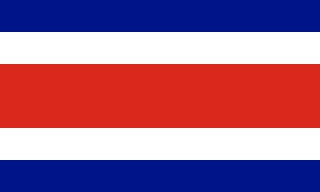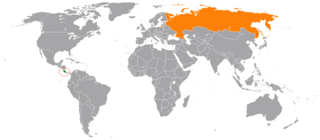
Costa Rica, officially the Republic of Costa Rica, is a country in the Central American region of North America. Costa Rica is bordered by Nicaragua to the north, the Caribbean Sea to the northeast, Panama to the southeast, and the Pacific Ocean to the southwest, as well as maritime border with Ecuador to the south of Cocos Island. It has a population of around five million in a land area of 51,060 km2 (19,710 sq mi). An estimated 333,980 people live in the capital and largest city, San José, with around two million people in the surrounding metropolitan area.
A national trade union center is a federation or confederation of trade unions in a country. Nearly every country in the world has a national trade union center, and many have more than one. In some regions, such as the Nordic countries, different centers exist on a sectoral basis, for example, for blue collar workers and professionals.

The Costa Rican Football Federation, also known as FEDEFUTBOL or FEDEFUT, is the official association football governing body in Costa Rica and is in charge of the Costa Rica national football team and the Costa Rica women's national football team.
CTRN may refer to one of the following
Unions have been compared across countries by growth and decline patterns, by violence levels, and by kinds of political activity.
The Central del Movimiento de Trabajadores Costarricenses (CMTC) is a Costa Rican trade union center.
The Confederación Unitaria de Trabajadores (CUT) is a Costa Rican trade union national trade union centre formed in 1980 as a result of the merger of the Federación Nacional de Trabajadores Públicos and the Confederación General de Trabajadores. The CUT had 54 affiliated unions in 2004. It is affiliated with the World Federation of Trade Unions.

The Confederación Centroamericana y del Caribe de Fútbol, also known by its initialism CCCF, was the governing body of association football in Central America and the Caribbean from 1938 to 1961.

A referendum on the Dominican Republic–Central America Free Trade Agreement (CAFTA) was held in Costa Rica on 7 October 2007. It was originally to be held on 23 September 2007, but it was postponed on 5 June 2007 due to a court challenge. Opinion polls from April, July and August 2007 suggested that a majority of voters were in favour, while a poll from June saw a majority against. It was ultimately approved by 51.56% of voters.

Instituto Costarricense de Electricidad (ICE) is the Costa Rican government-run electricity and telecommunications services provider. Together with the Radiographic Costarricense SA (RACSA) and Compañía Nacional de Fuerza y Luz (CNFL), they form the ICE Group.
The Costa Rica national baseball team is the national baseball team of Costa Rica. The team is controlled by the Costa Rican Amateur Baseball Federation, and represents the nation in international competitions. The team is a member of the Pan American Baseball Confederation.

The bilateral relations between Costa Rica and Russia date back to 1872, when Costa Rican president Tomás Guardia and Emperor of Russia Alexander II exchanged correspondence. Relations were not formally established until 1944, at the final stages of World War II, when the Russian Empire was already succeeded by the Soviet Union.

Josué Isaac Martinez Areas is a Costa Rican footballer who currently plays for Guadalupe.

David Alberto Guzmán Pérez is a Costa Rican professional footballer who plays as a defensive midfielder for Liga FPD club Saprissa and the Costa Rica national team.

The Costa Rican Athletics Federation is the governing body for the sport of athletics in Costa Rica. Current president is Geen Clarke.
Trade unions in Costa Rica advocate for the rights of workers in Costa Rica. Dating back to the late 1800s, labor unions in the country have been a political force. They remain active in political and social life for many Costa Ricans.
The Practical Shooting Association of Costa Rica, SpanishLa Asociación de Tiro Práctico de Costa Rica, is the Costa Rican association for practical shooting under the International Practical Shooting Confederation.
Trade unions in Norway first emerged with the efforts of Marcus Thrane and the formation of the Drammen Labour Union in 1848 which organised agricultural workers and crofters. However, with Thrane's imprisonment and the suppression of the union in 1855, it was not until 1872 before a union was founded again, by print workers. In 1899 the first national federation, the LO, was founded. During this period interactions with trade unions in Denmark and Sweden played a great influence over the development of trade unions in Norway.
Anarchism in Costa Rica emerged in the 1890s, when it first came to the attention of the country's ruling elites, including the Catholic Church.









